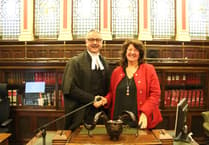The annual Illiam Dhone commemoration at Hango Hill near Castletown provides a platform for the windswept rhetoric of woolly nationalism.
Held every January 2, the event honours the memory of William Christian, the supposed Manx patriot who was executed on that date, at that place, in 1663.
The gathering is usually treated to vehement denunciations of the political and economic status quo, somewhat in the style of the People’s Front of Judea, although this year the tone was more conciliatory.
According to the nationalists, Christian was a martyr who died in defence of the island’s independence and the rights of its people, a hero who symbolised Manx resistance to English oppression.
But was he really the Isle of Man’s very own version of Braveheart? Or is that view a relatively modern invention, like the Illiam Dhone ceremony itself and the political nationalism that created it?
William Christian, known in Gaelic as Illiam Dhone (’brown-haired William’), was a member of the island’s landed establishment and a senior local official working for the Lord of Man, James the 7th Earl of Derby. His role as Receiver General, collecting rents and customs duties, made him the right-hand man of the feudal regime.
During the English civil war James and his wife the Countess Charlotte were prominent Royalists. As the Parliamentarians gained the upper hand, the Isle of Man became one of the last outposts of support for the king.
In 1651 James went to fight in Lancashire, where he was subsequently beheaded. His departure left Charlotte in charge at Castle Rushen, and the island awaited the imminent arrival of a Parliamentarian invasion fleet.
Amid rumours that the countess was about to do a deal with the invaders and sell out the island for tuppence, Christian hosted a mass meeting of concerned Manxmen at his Ronaldsway home.
It was agreed the local militia would rise up against the Derbys, and they offered no opposition when the Parliamentarians landed. Charlotte was soon forced to surrender and allowed to leave the Isle of Man.
The historic Manx rebellion ended up as a bloodless coup, but what motivated it?
Contemporary references point to grievances about land tenure and the quartering of Royalist troops. But the most obvious and sensible reason to surrender was to avoid the bloodshed that had happened elsewhere when places held out against the Parliamentarian forces.
As for Christian himself, witnesses alleged he had made a prior arrangement with those forces to deliver the Isle of Man into their hands. He was certainly well positioned as a key local contact and went on to become Governor as well as Receiver General under the new rulers.
When accounting irregularities were discovered Christian fled to England, where he eventually spent time in prison for debt. Following the restoration of the monarchy he returned home in the belief that the royal pardon for civil war transgressions also applied to the Isle of Man.
Charles, the vengeful son of the late Earl of Derby, took a different view and engineered the conviction and execution of Illiam Dhone for treason.
If Christian’s main motivation for rebellion was to defy English authority in defence of Manx rights, he does not say so in what is purported to be his final speech. In this document, which only surfaced 113 years after his execution, Christian strongly denies disloyalty to the earl or the king.
Nor is there much hint of proto nationalism in the traditional Gaelic ballad lamenting the death of Illiam Dhone. This is largely a diatribe against his jealous insular enemies, who sound like a particularly dangerous bunch of Manx crabs.
By the time of A W Moore’s definitive history of the Isle of Man published in 1900 there is still no portrayal of Christian as a critical actor in the story of the island’s constitutional development.
What made Illiam Dhone valuable to 20th century Celtic nationalists was the fact that he was killed by the authorities.
Romantic nationalism needs martyrs and blood sacrifice to inspire the faithful, as seen in the Irish republican tradition. William Christian was the only potential candidate for the Isle of Man version of this narrative and his CV was stretched to fit.
If a martyr is defined as someone who willingly faces death for their principles, Christian does not seem an easy match for the job description. In switching to the winning side in the civil war he cannot have foreseen fatal consequences, and indeed he only returned to the island when he was confident of the protection of the royal pardon.
Today the debate about Illiam Dhone centres around whether he was a patriot or traitor, but perhaps he was neither.
There is not enough evidence of noble motivation to justify the former description, and the latter is valid only if disloyalty to the Derbys is equated with betrayal of the Isle of Man.
The effect of Christian’s conduct was to save the island’s people from slaughter, but that outcome alone does not elevate him to the heroic martyrdom of Mec Vannin mythology.
It may be that what made William Christian tick was a very Manx mixture of pragmatism and opportunism, which in later generations exploited openings for gain in such fields as smuggling and offshore finance.
If Illiam Dhone had lived in modern times would he have been an idealistic nationalist like the good folk at Hango Hill? Or would he have been in Athol Street, doing well for himself?




